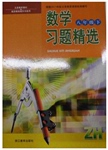题目内容
No other salesmen could know how to increase sales, but soon Tim _______ a good solution.
A. came up with B. caught up with
C. kept up with D. put up with

 习题精选系列答案
习题精选系列答案He was 11 years old and went fishing every chance he got from the dock at his family’s cabin on an island in the middle of a New Hampshire lake.
On the day before the bass season opened, he and his father were fishing early in the evening, catching sunfish and perch (鲈鱼) with worms. Then he tied on a small silver lure(鱼饵) and practiced casting. The lure struck the water and caused colored ripples in the sunset, then silver ripples as the moon rose over the lake.
When his peapole doubled over, he knew something huge was on the other end. His father watched with admiration as the boy skillfully worked the fish alongside the dock.
Finally, he very gingerly lifted the exhausted fish from the water. It was the largest one he had ever seen, but it was a bass. The boy and his father looked at the handsome fish, gills playing back and forth in the moonlight. The father lit a match and looked at his watch. It was 10 P.M.-- two hours before the season opened. He looked at the fish, then at the boy.
“You’ll have to put it back, son,” he said.
“Dad!” cried the boy.
“There will be other fish,” said his father.
“Not as big as this one,” cried the boy.
He looked around the lake. No other fishermen or boats were anywhere around in the moonlight. He looked again at his father. Even though no one had seen them, nor could anyone ever know what time he caught the fish, the boy could tell by the clarity of his father’s voice that the decision was not negotiable(可协商的). He slowly worked the hook out of the lip of the huge bass and lowered it into the black water.
The creature swished its powerful body and disappeared. The boy suspected that he would never again see such a great fish.
That was 34 years ago. Today, the boy is a successful architect in New York City. His father’s cabin is still there on the island in the middle of the lake. He takes his own son and daughters fishing from the same dock.
And he was right. He has never again caught such a magnificent fish as the one he landed that night long ago. But he does see that same fish-again and again-every time he comes up against a question of ethics (道德规范).
1. Why did the father ask his son to put the perch back?
|
A.Because the father disliked the perch. |
|
B.Because the father was afraid of being fined |
|
C.Because the ethics must be obeyed. |
|
D.Because the son was more experienced in fishing than his father. |
2.When does the architect (the father’s son) think of that perch put back?
|
A.When he takes his own and son and daughters fishing from the same dock. |
|
B.When he builds many famous buildings. |
|
C.When he pays a visit to his old father. |
|
D.When he faces some problems about ethics. |
3.Which word can not be used to describe the boy’s father?
|
A.honest |
B.noble-minded |
C.caring |
D.generous |